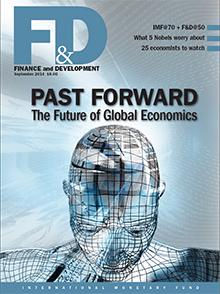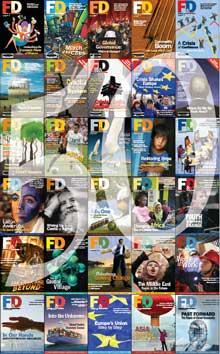IMF Survey: F&D Magazine’s 50th Birthday Issue Looks at Global Economics

The September 2014 issue of Finance & Development magazine commemorates the publication’s 50th year of publication.
ANNIVERSARY ISSUE
F&D Magazine’s 50th Birthday Issue Looks at Global Economics
Marina Primorac
August 27, 2014
- F&D magazine marks golden anniversary, 50 years after 1964 launch
- Special issue examines how the economy has changed and the challenges it faces
- F&D reveals what 5 economics Nobelists worry about at night, and lists 25 economists under age 45 who are shaping the global economy
The IMF’s Finance & Development (F&D) magazine marks its golden anniversary with a number of special features in its recently released September issue on the future of the global economy and a look back at how things have changed over the past 50 years.
The 50th anniversary issue of F&D magazine opens with a look at the changes the global economy the past half-century. Economists Ayhan Kose and Ezgi Ozturk describe how technological advances in communications and trade have affected the way an F&D article is written, how the statistics behind its charts are produced, and copies of the magazine printed and shipped.
Kose and Ozturk observe that global actors have grown in number and diversified in power, moving toward a multipolar economy. And the global economy grew faster than the earth’s population, offering a better standard of living with longer life expectancy for the average world citizen that is enhanced by improvements in medical technology and education. Nevertheless there are serious threats to continued improvement in wellbeing, including increased inequality in most countries and global climate change.
Indeed, the world’s top economists agree these are issues we need to worry about. F&D asked five Nobel prize–winning economists—George Akerlof, Paul Krugman, Robert Solow, Michael Spence, and Joseph Stiglitz—what keeps them up at night. Their responses ranged from inequality to climate change to helping lagging countries catch up with the rest of the world, and getting affluent economies back into gear.
Martin Wolf of the Financial Times examines globalization—the integration of economic activity across borders, along with the spread of people and ideas—and how it is shaped by technology, institutions, and policy. He argues that benefits in the form of diffusion of power and decline in mass poverty have been tempered by political control of borders, migration, and regulations, and concludes that wise political choices are needed to maximize globalization’s opportunities.

Looking ahead, economists in the IMF’s Strategy, Policy, and Review Department are trying to predict what long-term trends have the most potential to influence—or disrupt—the global economy. In line with our Nobel economist advisors’ predictions, IMF staff fortune tellers conclude that the potential impact on economic growth of trends in demographics, diffusion of power, resource and environmental sustainability, interconnectedness, and income inequality make them the most relevant trends for the IMF and its membership. As the IMF maps its work from managing transition from the crisis to the longer-term future, its staff will be keeping these considerations in mind.
As the magazine celebrates its 50th anniversary, the IMF is marking its 70th. On this occasion, IMF Managing Director Christine Lagarde charts a course for the IMF’s future in an FD Straight Talk column. She observes that the IMF has constantly adapted to changing circumstances, and will need to remain true to its mandate in the future. This includes adjusting to new challenges such as climate change, income inequality, increased participation of women in the labor force, and dispersion of power.
The intricacy of measuring inequality is the focus of an article by IMF research economists Jonathan Ostry and Andrew Berg; and Stanford University’s Jeffrey Ball examines how new energy discoveries are changing the balance of power. And Olivier Blanchard, head of the IMF’s Research Department, writes in an FD article that the recent financial crisis has taught us to pay attention to the “dark corners” where unexpected economic dangers lurk.
Looking Back
An anniversary issue cannot help look back at the past.
In FD’s first-ever graphic format article, cartoonist Nick Galifianakis of Washington Post fame illustrates the story of the IMF and global economic cooperation. And Atish Rex Ghosh reviews how the IMF has adapted to changes in the international monetary system over the past seven decades.
In addition to being the launch year for FD, 1964 was the occasion of The Beatles’ first major overseas tour. FD’s Simon Willson explains how, given the constraints on foreign exchange at the time, the Fabulous Four’s U.S. concerts offered Britain important access to foreign exchange.

The print edition of the magazine includes a souvenir poster commemorating the publication’s 50th anniversary. The poster features covers from the past decade, on topics ranging from inequality to the global crisis; youth to aging; sports to philanthropy; and special focuses on all regions of the world. The magazine is now published online at www.imf.org/fandd and in hard copy in Arabic, Chinese, French, Russian, and Spanish.
■ Also in the September 2014 issue of FD, the IMF’s Janet Stotsky profiles economics giant Kenneth Arrow; Back to Basics answers “What Is Keynesian Economics?”; word clouds illustrate changes in FD’s language over the past five decades; and FD reviews new books by Pulitzer prize–winner Liaquat Ahamad, Nobelist Joseph Stiglitz, and Sky News journalist Ed Conway.
Write to us
The IMF Survey welcomes comments, suggestions, and brief readers' letters, a selection of which are posted under What readers say. Letters may be edited. Please address Internet correspondence to imfsurvey@imf.org.
Legal Disclaimer:
EIN Presswire provides this news content "as is" without warranty of any kind. We do not accept any responsibility or liability for the accuracy, content, images, videos, licenses, completeness, legality, or reliability of the information contained in this article. If you have any complaints or copyright issues related to this article, kindly contact the author above.
